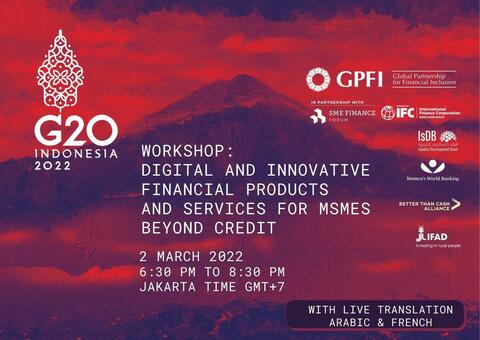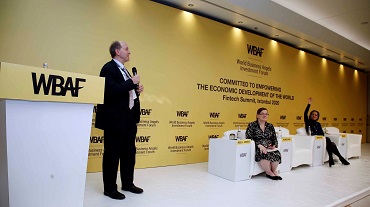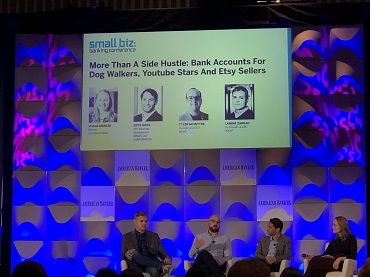Blog
Innovating Financial Products and Services for MSMEs beyond Credit

This blog is a summary of the G20 Workshop on Digital and Innovative Financial Products and Services for MSMEs Beyond Credit. G20 countries’ Global Partnership for Financial Inclusion (GPFI) organized the virtual workshop with the Indonesia G20 Presidency on March 2, 2022. More than 500 industry leaders participated in the event and joined the discussion.
Dr. Magda Bianco, a Co-Chair of GPFI and Head of Directorate General for Consumer Protection and Financial Education, Banca d’Italia, and Bapak Febrio Nathan Kacaribu, Chairman of the Fiscal Policy Agency, Indonesia Ministry of Finance, welcomed the speakers and audience. Digital and innovative financial products and services are playing a significant role in facilitating the growth of small businesses by enabling them to overcome financial constraints and promoting financial inclusion. As the Covid-19 pandemic enters its third year, the global financial market remains impacted: inflation, supply chain disruption, and energy crisis. Despite its significance in job creation and investment, the MSME sector is one of the most vulnerable and underserved groups in many economies. And the pandemic has led to the SMEs’ loss of income and increased difficulties accessing finance, which increased their fragility. Therefore, it is necessary for various financial and non-financial institutions to empower the SMEs by exploring new financial products and services beyond credit. The workshop featured exemplary practices in the industry and demonstrated how technologies, such as digital payments, insurance, and risk management, can benefit women entrepreneurs, youth entrepreneurs, startups, and social finance recipients.
Importance of Digital and Innovative Financial Products and Services for MSMEs beyond Credit
Four industry leaders joined the first panel discussion, Importance of Digital and Innovative Financial Products and Services for MSMEs beyond Credit.
Joyce Tee, MD and Group Head of SME Banking at DBS Bank shared the bank’s journey to support small businesses in Asia. When offering digital solutions, DBS always ensures that they are relevant to the SMEs and able to closely engage the community. However, the bank’s foremost priority is sustainability. For example, DBS provides social enterprises with a wide range of assistance, including interest-free loans during the pandemic and access to alternative capital sources. Additionally, technology has allowed DBS to interact with its SME clients in a completely digital way, from application, onboarding, monitoring, until fund disbursement. These convenient and instant services not only strengthen the digital connection between the financial institution and the SMEs but also bring digital intelligence to these clients.
Kathryn Petralia, President and Co-Founder of Kabbage, shared her observations on the rising vulnerability of small businesses during Covid-19 and Kabbage’s response. While many financial institutions were not capable of serving SMEs remotely, Kabbage was well-equipped digitally to interact with its SME clients. When the U.S. government initiated the Paycheck Protection Program (PPP), Kabbage seized the opportunity and eventually became the second largest lender by application volume in the program (second only to the much larger JP Morgan Chase bank). The fintech processed $7 billion in PPP loans to nearly 300,000 small businesses, a far higher number than the larger bank. Overall, Kabbage’s PPP loan average size was $23,546 with a median of $12,775, compared to the average PPP loan amount of $100,000 + for US commercial banks. Kabbage’s experience exemplifies how digital automation can enable lenders to engage viably with small and vulnerable businesses.
The Chairman of NCBA Kenya, Isaac Awuondo, spoke about the new digital practices of this Kenyan bank. Awuondo pointed out that many people find banking processes quite complicated and challenging, which has discouraged them from accessing financial sources. With the aid of technology, NCBA Group not only simplifies customer acquisition but also allows its clients to access banking services with greater convenience. NCBA has applied technological innovation to several aspects, including digital payments, access to credit, and retention of deposits. Allowing the clients to conduct banking activities at any time of the day and disbursing small working capital loans immediately upon existing customer request, the bank is processing 4.5 million transactions every day. NCBA disbursed $3.9 billion in Kenya in 2020 and $5.1 billion in 2021. SME unsatisfied credit demand in Kenya remains considerable and is expected to rise in the future. NCBA aims to use technology and data analytics to build a tighter connection with the small business owners and drive the access to financial products and services more broadly in the African market.
Adrian Gunadi, Founder and CEO of Investree, shared his experience of building a platform for SMEs going beyond mere finance. Aiming to meet the needs of underserved SMEs, Investree utilizes alternative credit scores and data analytics to provide small businesses with short-term capital solutions. At the same time, the fintech company has collaborated with other ecosystem partners to embed financial solutions into larger buying and selling systems. Investree has connected various industry verticals, including transportation, logistics, and supply chain technologies. In Indonesia, an increasing number of SMEs are transforming digitally as a result of the pandemic. By partnering with other ecosystems, Investree is able to capture the transactional histories of SMEs and build credit profiles for them through data integration. The fintech also facilitates small businesses connection with B2G, eCommerce and procurement sites. Investree also offers more business service products, such as digital invoicing and inventory management. These innovative financial services and products not only improve the operations of SMEs but also let Investree have direct access to more transactional data to build credit risk profiles.
Six innovative digital practices which go beyond credit in business/client management, financial education, economic empowerment, and insurance
In the second session, six financial institutions shared their innovative digital practices which go beyond credit in business/client management, financial education, economic empowerment, and insurance.
Maor Aharoni talked about how vCita actively helps solve the primary concern of small enterprises – how to get paid for their products and services. The vCita App is a complete business management platform that comprises functions including payment collection and tracking, client relationship management and communication, as well as appointment and event management etc. Through driving digital adoption and bringing corporate capabilities to small businesses, vCita builds more resilient SMEs and unlocks new revenue opportunities for them.
Zainab Saeed shared Kashf Foundation’s experience in empowering women entrepreneurs through non-financial services. In Pakistan, women entrepreneurs face myriad challenges, which are not limited to financial exclusion: low level of education, limited mobility, and regulatory hurdles. Hence, it is necessary to offer solutions beyond credit. Kashf’s transformation-based approach consists of of four major objectives: investment into income generation activities, risk protection through insurance, increased acceptance of Women’s economic role, and enhanced capability to run successful businesses. Through different programs and trainings, Kashf has built communities for women and enabled them to develop business management capacities.
Joseph Nnanna from Development Bank of Nigeria also talked about the bank’s latest practice in financial education. Aiming to promote growth and sustainability, DBN facilitates socio-economic development through the provision of finance to the underserved small businesses through eligible financial intermediaries. Over the past five years, the bank has trained over 1,200 micro, small, and medium enterprises and disbursed $1.14 billion loan to PFIs. Regarding capacity building as one of its core mandates, DBN has designed a comprehensive training program with well-developed curriculum customized to meet the needs of SMEs, including marketing management, financial and operations management, negotiation, and green financing, etc. The post-training assessment shows great impact on the micro enterprises: 53% of the attendees were processing credit facilities with financial institutions, 47% improved access to markets and visibility, and 77% developed bankable business plans five months after the program.
Alexandra Stuart shared VISA’s experience in empowering women entrepreneurs through financial education in Indonesia and Dominican Republic. As VISA made a global commitment to digitize 50 million small businesses by the end of 2023, the payment network recognized the fundamental importance of empowering consumers and merchants through education. In Indonesia, VISA partnered with existing MSME communities and government to launch Ibu Berbagi Bijak (Women Sharing Wisdom), a financial education campaign, designed to help women gain practical financial skills through digital materials and offline workshops. The influencers/bloggers and women business owners joined the workshops as mentors. With both online (social) and offline channels, the program has impacted 300,000 lives since 2017. In Dominican Republic, VISA initiated Mujeres Super Emprendedoras (Women Super Entrepreneurs). In collaboration with the government, VISA piloted the project in 2021, offering courses in budgeting, digital marketing, and management skills. By providing tablets to participants, Fundes (NGO) developed an innovative online training platform, ENKO, for women entrepreneurs. 85% of attendees completed the 25 lessons easily since the modules are short and can be viewed offline. After the pilot, 100% participants reported that they improved business skills. In the second phase, VISA will extend the ENKO license to 5,000 entrepreneurs.
Mohamed Mazen Dakhli spoke about how Islamic Development Bank has been empowering women entrepreneurs through a partnership with incubator. Over the past twenty years, the institution has shifted its methodology from financial inclusion to economic inclusion. Except for the traditional solutions, such as insurance, loan for basic needs, and financial education, the IsDB empowers the small businesses through smart partnerships, capacity building, investment opportunities, as well as appropriate funding and infrastructure. For example, the IsDB implemented the Ard El Kheir Initiative in Egypt. Targeting to create sustainable self-employment for the youth at the bottom of the pyramid, Ard El Kheir developed an incubator that trains young women in cattle fattening, allowing them to gain access to strong markets and earn fair revenue. By providing cattle and financing, the initiative minimizes the risk for the youth, who also developed networks and skills for living under the program to continue their business.
Jonathan Batagngan from Cebuana Lhuillier insurance introduced the Payong App, a multi-service resistance management and learning platform for MSMEs. Payong offers customized insurance products to the MSMEs to mitigate a wide spectrum of risks (the Philippines is one of the highest risk countries globally for climate risk events). In addition, the app is designed to improve the operational readiness of MSMEs, especially in the face of pandemic and natural disasters. The platform allows business owners to have a more comprehensive awareness of potentially disruptive events and to assess their potential impacts. Entrepreneurs also can develop a simplified business continuity plan through e-learning modules on the app.
G20/SME Finance Forum digital Living Digital Database
The workshop also introduced the G20/SME Finance Forum digital database collecting examples of successful innovations in this field from around the world. These non-credit financial products and services may include, among others, digital payments, insurance, factoring, leasing, guarantee, and other risk management products. Institutions, which have designed and implemented innovative financial products and services beyond credit to help MSMEs especially women entrepreneurs, youth entrepreneurs, and social finance recipients are strongly encouraged to contribute case studies.
To ensure consistent quality and integrity of the case studies, a panel of subject matter experts is being set up. The committee will review the submitted cases on a regular basis, seek clarifications and provide input where appropriate, before the case studies are accepted and published in the database.
Selected cases will be used as inputs into a G20 summary report which is expected to be drafted in June 2022.
Submit your successful cases at https://www.smefinanceforum.org/G20_casestudies
Watch the video to relive the whole session








